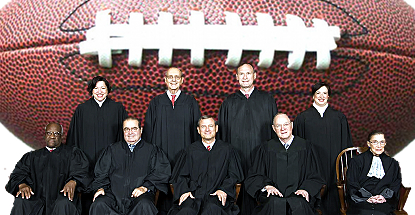 A federal grand jury has indicted Nevada sports bettor Glen Cobb, his octogenarian parents and his 31-year-old daughter on charges of illegal bookmaking and structuring financial transactions in a bid to avoid federal reporting requirements. The Las Vegas Review-Journal reported that the nine-page indictment was handed down on Tuesday as federal prosecutors attempt to recover an estimated $13.2m from the defendants. The feds say the illegal betting ring was in operation between March 2011 and December 2013 and reportedly involved unidentified internationally licensed online sportsbooks. The defendants are to be arraigned on June 12.
A federal grand jury has indicted Nevada sports bettor Glen Cobb, his octogenarian parents and his 31-year-old daughter on charges of illegal bookmaking and structuring financial transactions in a bid to avoid federal reporting requirements. The Las Vegas Review-Journal reported that the nine-page indictment was handed down on Tuesday as federal prosecutors attempt to recover an estimated $13.2m from the defendants. The feds say the illegal betting ring was in operation between March 2011 and December 2013 and reportedly involved unidentified internationally licensed online sportsbooks. The defendants are to be arraigned on June 12.
Meanwhile, New Jersey’s quest to undo Nevada’s single-game sports betting monopoly is moving ever closer to a resolution. The US Supreme Court will meet on June 19 to consider whether it will hear New Jersey’s appeal of lower court rulings blocking the state’s sports betting legislation, with the Court’s decision to be made public on Monday, June 23. The state and its allies have filed reply briefs with the Court, their last chance to make their case before the nine Justices make up their minds.
The brief filed by star lawyer Theodore Olson on behalf of New Jersey Gov. Chris Christie argues that the 1992 federal PASPA sports betting prohibition is such a unique constitutional travesty that the Department of Justice and the sports leagues opposing New Jersey’s plans “do not [and cannot] cite a single comparable law.” Olson used the phrase “Orwellian” in describing the DOJ’s insistence that PASPA was written to “assist states in their efforts to prevent” sports betting, given that the feds are actively blocking the will of New Jersey voters, who overwhelmingly approved the sports betting plans in a 2011 referendum.
Another brief was filed by the heads of the state’s two legislative bodies, whose attorneys argued that PASPA usurped states’ rights by “permitting Congress to command the States not to regulate an activity that Congress has not undertaken to regulate itself.” Attacking the DOJ’s argument that PASPA merely requires the states to maintain the status quo, the brief warns that Congress could “evade” the Constitution’s anti-commandeering doctrine anytime it liked provided their wording is “artfully phrased to avoid requiring any ‘affirmative action.’”
The legislators argue that the Court’s precedents “neither invite nor support this semantic limitation on the anti-commandeering doctrine and that limitation threatens the doctrine’s very efficacy.” The legislators appeal to the Court’s federalist impulses by suggesting that upholding PASPA would have ramifications far beyond the realm of sports betting. What’s at stake here is “no less than saving a critical barrier against federal overreaching into sovereign state functions.”
Should the Court agree to hear New Jersey’s appeal, it’s likely that oral arguments wouldn’t be heard until early next year, which would push a final verdict well into 2015. Should the Court decline to lend New Jersey their ears, other anarchic options abound.
